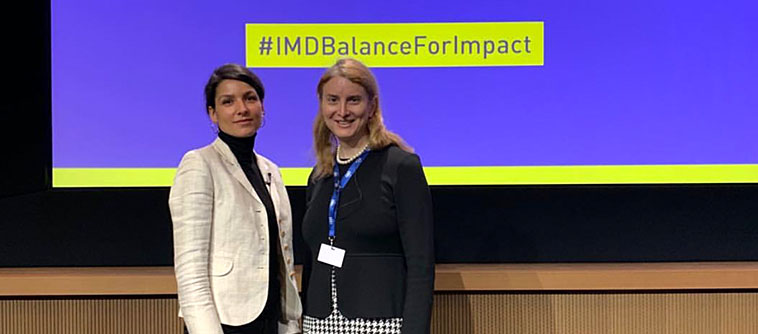
Ahead of International Women’s Day, on 8 March, the IMD Alumni Club of Lausanne and the MBA office hosted an IMD community event on campus entitled ‘Gender Diversity as a Driver for the Business World.’
Guest speakers Eglantine Jamet, gender studies expert and founding partner at Artemia executive search firm, and Bea Knecht co-founder and Chairman of the Board of Zattoo, discussed what still needs to be done to breakdown stereotypes for women in the workplace.
Presenting some eye-opening statistics – like the fact that 55% of all higher education degrees go to women while women only hold 7% of C-suite positions – Eglantine made the case that companies are more profitable and have higher collective intelligence when they are truly gender diverse. She argued that stereotypes should stop being reinforced, among children as well as adults, and that men too benefit from a less gender-based hierarchical world.
Bea Knecht, an alumna of IMD’s MBA program, pointed out how women face numerous obstacles in the pursuit of expertise and face more external challenges than men in their careers. She told the audience that women need to be more directive and assertive communicators. “We live in a world where men do the architecture and women do the decoration. We need that to shift,” Bea said.
Ahead of the event IMD caught up with Eglantine Jamet to discuss her views of women in the workplace based on her impressive experience in the field of gender studies.
IMD: What is the significance of International Women’s Day to you?
Eglantine: International Women’s Day is important to shed light on the situations of violence and injustice that women still face throughout the world, particularly in regard to civil rights, access to education, health and resources. That day is useful to raise awareness, but it is clearly not enough and there is always some irony in thinking that one day in the year is devoted to women, as if women were a “minority”. On the other hand, if that day is used to celebrate “women” in an essentialist view, with commercial promotions and stereotypes of “femininity”, it’s clearly not going in the right direction.
IMD: The World Economic Forum’s Global Gender Gap 2018 Report found that while the global gender gap has narrowed slightly, fewer women are participating in the workforce. The Forum suggests that the rise of technologies across a range of industries may, in fact, play a role in exacerbating these gender gaps. Will A.I. make the gender gap in the workplace harder to close?
Eglantine: A.I. is the same as science: it is designed by humans with a perspective that can never be neutral. So, the biases and power relations that exist in our world are incorporated in the algorithms that are used, so that the gender gap can be maintained and even exacerbated by A.I. That is why gender issues need to be considered transversally and in all new technologies.
IMD: The gender pay gap starts to expand after women have children. At first, both parents’ incomes take a knock, but men’s quickly recover. Women’s never do. What do you think of the new initiative of a four-day work week? Is flexible working becoming the new norm?
Eglantine: The corporate world developed in the aftermath of the industrial revolution, during a period when women were sent back to the “private sphere”. Organizations were thought out for middle-class white men who did not have to cope with their families, and a good employee was meant to devote his life to his career. This model is not very positive for men either and today is clearly no longer adapted to people’s lives. Therefore, flexible working is key to a better gender balance and to the well-being of both men and women.
IMD: What do you think is the biggest obstacle for gender equality in the workplace today?
Eglantine: Unconscious bias, stereotypes, the fact that there exists a hidden unconscious reference model of leadership that is rather exclusive and impairs the career development of women. The fact that women are still seen as “potential mothers” and as people who will give their priority to their family. The fact that parenthood is never thought as an issue concerning men.
IMD: What would be your advice when mentoring a young woman starting her career? Tips on confidence, negotiating and/or being heard in meetings?
Eglantine: Being assertive while remaining authentic. Never step back. Believe that you can have it all and choose the partner who enables you to have it all. Be aware that some lack of confidence or the ordinary sexism that is experienced at work is not a personal but political question.
IMD: What does ‘being a leader’ mean to you?
Eglantine: Someone who has a vision and the ability to mobilize and bring people together people around it.
Find out more about IMD’s commitment to women in business


